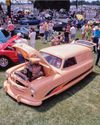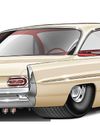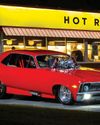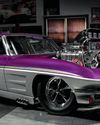
Formula 1 and American muscle are two automotive genres that don’t usually meet. F1 cars are high revving, mid-engine toothpicks on wheels, while muscle cars are big V8 coupes with the aerodynamic qualities of a brick. But hey, who cares when you have torque? Despite their lack of similarities, SpeedKore Performance Group decided that Detroit could learn a thing or two from Monaco.
Since 2015, SpeedKore has been sending icons of American muscle to finishing school, outfitting their various modern muscle cars with high-performance powertrains, custom-designed frames, and, most notably, famous F1 lightweight technology in the form of carbon fiber. Their most recent creation, a 1970 Dodge Charger dubbed Hellraiser, is built entirely of the stuff. It dropped 600 pounds from its original curb weight while gaining about 600 horsepower by way of a 426 Hellephant V8 from Mopar.
We were curious about SpeedKore’s carbon-fiber process, so we dropped in at the company’s Grafton, Wisconsin, workshop to learn more about this go fast gold.
A Brief History of Carbon Fiber
Carbon fiber made its automotive debut on the 1981 McLaren MP4/1 Formula 1 car. Not long after, it trickled down into the highest tier of on-road performance with supercars like the Jaguar XJR-15 and McLaren F1. The added stiffness and reduced weight of carbon made it the perfect material for motorsports applications.
Today, carbon fiber is more widespread than ever, but it’s still primarily reserved for high-horsepower, high-dollar exotics. A few mainstream cars use carbon components as structural pieces, but the lion’s share of OEM carbon fiber is nothing more than automotive jewelry with negligible performance benefits.
This story is from the {{IssueName}} edition of {{MagazineName}}.
Start your 7-day Magzter GOLD free trial to access thousands of curated premium stories, and 9,000+ magazines and newspapers.
Already a subscriber ? Sign In
This story is from the {{IssueName}} edition of {{MagazineName}}.
Start your 7-day Magzter GOLD free trial to access thousands of curated premium stories, and 9,000+ magazines and newspapers.
Already a subscriber? Sign In

What Is Pro Street?
You know it when you see it.

Pro Street in Pure Vision
Builder Steve Strope weighs in on the Pro Street look and what he would build today.

THE GAS ERA LIVES ON
These vintage race cars chart the evolution of technology in the early days of drag racing.

MOTOR HEAD FOR LIFE
Scott Sullivan is one of the original Pro Street pioneers. He still builds cars today out of a small shop in Dayton, Ohio.

BRINGING BACK PRO STREET!
David Freiburger and Roadkill Garage built a Pro Street Nova.

SWEET ASPIRATIONS
Jerry and Matthew Sweet added an 800ci Pro Stock mountain motor to chase HOT ROD Drag Week's Pro Street NA Record.

Making Bad Decisions Badder
Bradley Gray's 1970 Nova is a Hybrid! It's a streetable Funny Car.

ART PROJECT
This Rad Rides by Troy-built '63 split-window Corvette went from restaurant prop to ripping up the street!

WHERE DO WE GO FROM HERE?
THE PRO STREET ERA PEAKED IN THE '80S. ARE WE IN THE BEGINNING OF A RESURGENCE?

Making Connections
Project T-top Coupe: We install a Terminator X Max for big power.